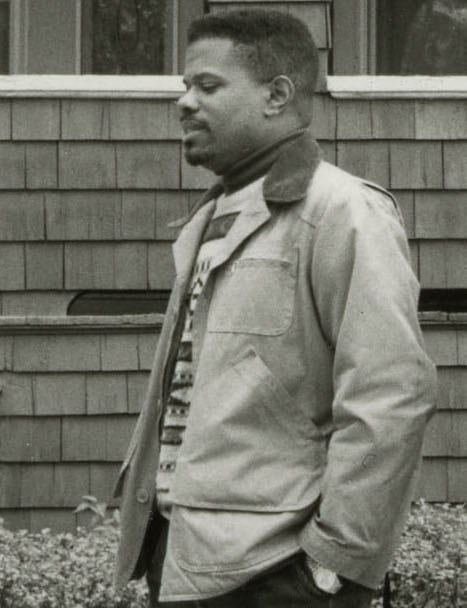John Keene
“Truth is a valid way of beginning.”

Photo: Furious Flower Conference Program, 1994
John Keene is not only a poet, but a writer of fiction and non-fiction works, including shorts stories, poetry criticisms, and French, Spanish, and Portuguese translations. He met Ellis and Strange at Harvard and joined the Dark Room Collective. At the time of the 1994 Conference, John Keene had not yet published his first book, Annotations (1995), which told the semi-autobiographical story of coming of age as a black, queer, middle-class kid in St. Louis circa the ‘70s and ‘80s. Ten years later he published the story collection, Counternarratives, comprised of fictional reimaginings of historical events. He was selected as a Macarthur Fellow in 2018, and has won many awards, including the Windham-Campbell Prize, a Whiting Award in Fiction, the Lannan Literary Award, and an American Book Award. He has also received fellowships from Cave Canem, the Bread Loaf Writers’ Conference, the New York Times Foundation, and the Pan-African Literary Forum. He has taught at Northwestern University and Rutgers University and served as managing editor for Callaloo.
Featured Poems
“Why I Love My Father”
Interviews, Talks, and Readings
/ John Keene reads “Why I love My Father”
Is not a matter for literary study
That kind of feeling festers like sepsis
in darker chambers. Each of those
Negro men had a story to tell, a song
and dance for sons as though a bar and hop
Could do no wrong. redeem it. Did not.
Theme of a child he could not abide
in silence, rooms, vodka-soaked dramas.
Counter-theme: a mother, his savior.
But why was the one forgiven? Not act,
but process. Agony as redress. When
at last we arrived at the grave of loving I
abandoned words as a point of ceremony.
That much evolved into a first write-crisis.
We crossed, he and the one who favors him
in crow-eyes, sugar-tongue, blacker brow
as a seal of birthrite, deceit as the price
of living. (Rage was a bridge across glacial
embraces.) Later, after proving yourself worthy
of yourself came the task of forging on as in
forgetting, not another routine order. Provident-
ially I remembered. If, not like. Now you ask
the next question, son. How does it end, do you
forgive? Nothing clears the air like a leaving. I live
with what I was given, wave claims, decline
the chain. Truth is a valid way of beginning.
Related Links
Seeding the Future of African American Poetry
Interactive Program Day III
Timeline: History, Witness, and the Struggle for Freedom in African American Poetry